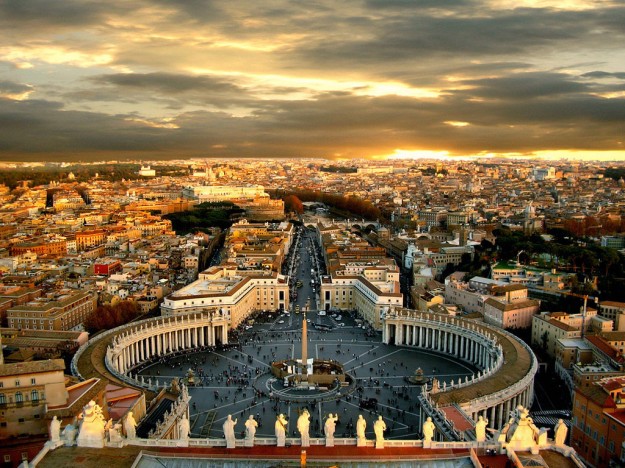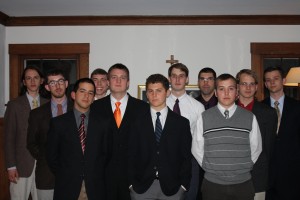
Written by Alessandro Marchetti ’12, Philosophy and Catholic Studies
Often times people ask me how an East Coast kid born of Italian immigrants could have possibly ended up in Saint Paul, Minnesota for college. I usually answer one of two ways, both of which have a kernel of truth. One answer usually goes something along the lines of, “I ask myself that question every day.” The second takes some form of the following, “it was my road to my year in Rome.” (I suppose all roads lead to Rome, so this doesn’t quite answer the question). As I reflect back now as a senior looking toward graduation, whether or not I’ll ever be able to clearly articulate my reasons for coming to St. Thomas, there is no doubt that without Catholic Studies I would not have traveled past the Hudson river to attend school in Minnesota, despite the clear advantage of its plethora of lakes. Indeed, one answer that I do offer without fail is that these four years were better then I could have imagined.
There is no doubt I owe so much to my intellectual and spiritual formation to this department, its professors and classes but some of the greatest lessons I learned were not limited to the classroom (though, those we re plenty and primary). Rather, they were the lessons received by observing, working and living alongside the leaders in the Fraternity of Saint Michael, the men and women that run the Center and the professors (and their families) that lived in Bernardi, played in ultimate Frisbee tournaments and started and led the various (and splendid) projects that seem to grow out of every open crack in this building. To borrow a line from Fr. Giertych over in Rome, I witnessed “creative charity” at its best. Dawson says in every age a certain type of Saint rises in order to respond to the crisis of the day. Chesterton tells us that the saints offer the world around them the medication they need to combat the particular struggles of their world.
re plenty and primary). Rather, they were the lessons received by observing, working and living alongside the leaders in the Fraternity of Saint Michael, the men and women that run the Center and the professors (and their families) that lived in Bernardi, played in ultimate Frisbee tournaments and started and led the various (and splendid) projects that seem to grow out of every open crack in this building. To borrow a line from Fr. Giertych over in Rome, I witnessed “creative charity” at its best. Dawson says in every age a certain type of Saint rises in order to respond to the crisis of the day. Chesterton tells us that the saints offer the world around them the medication they need to combat the particular struggles of their world.
I see every day around me men and women who in their small (and sometimes bigger then we actually realize) sphere of influence actually take steps forward to build a Catholic culture in the here and now. They do this by first starting with their own hearts, then the people they encounter. They are rooted in tradition, they are creative and ready to respond, and for this reason they are and will continue to be successful. While I don’t intend to canonize any particular person in this department (just yet at least—not that I would ever have the power to do so), certainly at least by their example, the one lesson that each graduating senior should walk away with is that we as Catholics must learn to step up to the plate, utilize the lessons we have learned, recognize the problems and wounds that need to be tended to in the culture around us, and actually do something. I know I speak for all graduating Catholic Studies seniors when I say thank you to Catholic Studies for giving us the tools to do just that.